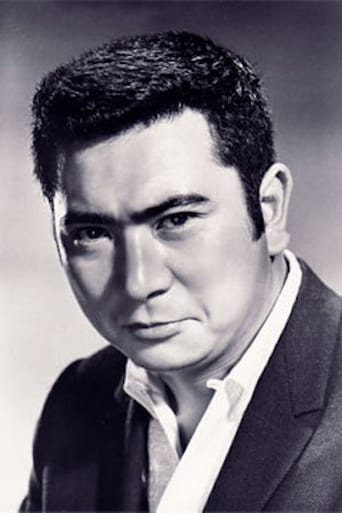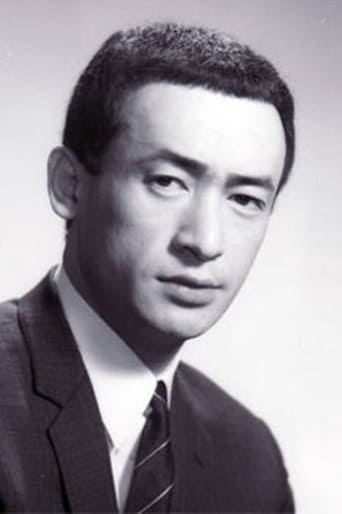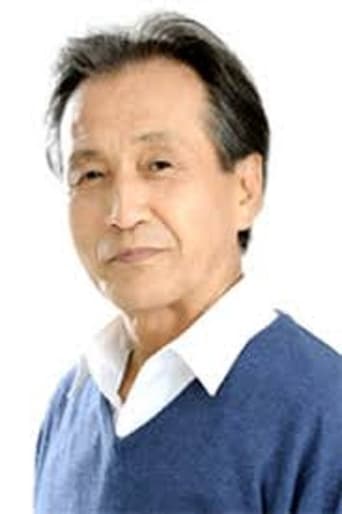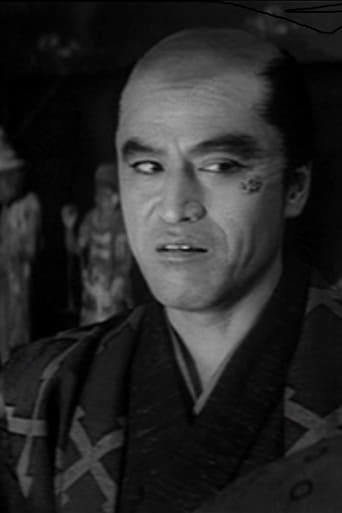Unlimitedia
Sick Product of a Sick System
Dorathen
Better Late Then Never
Humaira Grant
It’s not bad or unwatchable but despite the amplitude of the spectacle, the end result is underwhelming.
filippaberry84
I think this is a new genre that they're all sort of working their way through it and haven't got all the kinks worked out yet but it's a genre that works for me.
kluseba
Zatoichi and the Chess Expert is the twelfth entry in the franchise and one of the best movies about the blind masseur, skilled gambler and skillful swordsman. The story of this film is unusually clever, complex and twisted. Zatoichi meets a smart chess player while traveling on a ship and the two end up respecting one another so much that they start traveling together. When Zatoichi is attacked by some folks whom he tricked during a dice game on the ship, a young girl traveling with a beautiful woman gets injured, so Zatoichi organizes some medicine and travels with the two as he grows fond of the joyful child. Zatoichi also encounters a sick man and his sister who is disguised as a man to avoid trouble on the road who travel with a helpful retainer who gets brutally murdered during a prayer. Soon enough, these three seemingly different story lines end up being connected in most surprising ways as Zatoichi needs to figure out who is friend and who is foe.What I really liked about this film is the complex story with its numerous clever twists. The characters also have great depth. Even Zatoichi seems more emotional than usual as he opens up about the love of his life and his low self-esteem while being caring, helpful and respectful to those who need his help. The perfectly portrayed chess expert is hard to figure out because of his harsh convictions versus his impressive intelligence. The young woman Zatoichi travels with falls in love with the blind samurai and is at times desperate and at other times joyful about their complicated relationship. Her child is quirky but polite and its heart-warming to see how the girl and Zatoichi grow fond of one another. The sick man, his mysterious sister and his helpful retainer are also quite intriguing characters. This movie is more than just a classic chambara film and also a drama for all the complex relationships going on and a thriller because of the cruel murder of the retainer. The movie's atmosphere gets more and more mysterious throughout the nicely paced film. The landscapes are memorable, gorgeous and authentic, especially the port and ship in the beginning of the film and the modest inn with the hot springs that plays a central role in this film. The fight scenes are more vivid than in the preceding film. Most sword fights occur at the beginning and in the final five minutes but they are nicely choreographed. My favorite fight scene was when Zatoichi got ambushed in the middle of the night in the muddy meadows while carrying the expensive medicine for the sick child.There really isn't much to criticize regarding one of the franchise's very best films. Obviously, there are some recurring elements in the movie such as numerous gambling scenes, traditional sword fights and Zatoichi traveling through rural landscapes but these predictable elements give each film about the blind masseur their very own identity.If you like sword fighting movies or care for Japanese culture, history and nature, you will particularly like Zatoichi and the Chess Expert. You an learns more about Japan in one hour and a half here than you could by watching anime for a whole year. Since this is one of the most profound entries in the franchise, this movie would be recommendable to get to know a true piece of Japanese art.
alice_frye
I agree with the positive remarks left by others about the overall charm of this movie, but the real treasure is actor Mikio Narita (January 31, 1935-April 9, 1990.) He was one of the better character actors of his generation, which is obvious when you compare this performance to his portrayal of an effete imperial minister, who happens to be deadly with a sword, in "Shogun's Samurai", a/k/a "The Yagyu Clan Conspiracy." As Jumonji, Narita borrowed Sam Spade's unique gesture from "The Maltese Falcon," that is, when contemplating a problem, he rubs the side of his nose and then snaps his fingers when inspired with a solution. The script gives him plenty of opportunities to emerge as a full and unforgettable character, and his presence in this episode of the Zatoichi franchise is reason enough to see this film.
Tom (bighouseaz)
The year is now 1965 and this is the twelfth entry in the Zatoichi series. Far from being stale, Zatoichi and the Chess Master heralds the start of a three film run of some of the best the series has to offer. Katsu Shintaro is now fully adept in his role as Zatoichi and director Misumi Kenji does an excellent job with the material. The story is full of surprises and little twists and turns. Some people compare Zatoichi to Columbo, and it's easy to see why here.There is not a great deal of fighting in the film, but there is suspense and great character development. Two scenes are especially moving. First, when the little girl (Miki) is cured thanks to the medicine that Zatoichi procures at great danger to himself. Miki thanks Zatoichi, and Zatoichi is all choked up. All he can do is run out of the room, full of emotion, and truly blind. He runs head first into a wooden pole, stops, and pounds his head into the pole a few more times. The second memorable scene is the scene where the Chess Master (Jumonji) begins to believe that Zatoichi has the crime figured out. Zatoichi leaves the room, the two are only separated by a thin shoji screen. Jumonji slowly grabs for the hilt of his sword. On the other side of the screen, Zatoichi stands completely still, his hand moves towards the hilt of his sword. A tense moment ensues before Jumonji relaxes and so do we all! Zatoichi feels the Force. Now he probably passes his time practicing with Yoda somewhere far, far away.
rsoonsa
The state of blindness does not hinder the swordsman masseur, Zato Ichi, in this well-crafted tale of pre-modern Japan, as he is determined to do what is correct by assisting a young girl's recovery from a severe wound suffered in tangential fashion during a sword-fight involving gangsters in the bandit-ridden country. Of the approximately 25 Zato Ichi films, this must rank as one of the better ones, as Shintaro Katsu who portrays the sightless samurai during the entire series, permits us to see more of the inner man behind the warrior facade, aided by an interesting story written by Kan Shimozawa, who contributes the most complex scenarios of this group of works. In early civilized Japan, all masseurs were blind, as then they could not look upon the bodies of their clients, and Zato Ichi ("Ichi the Masseur") is following this tradition, but he is as well an inordinately successful warrior with his cane sword, mastering with cold aplomb each challenge by aggressors, no matter how many they might be. Ichi is a prototypical loner who makes his way in this work, as in all others, by massaging, while handsomely adding to his income through his cheating skills at gambling, since he is also an inveterate confidence man, yet one who makes mistakes and these errors in judgement serve in strengthening his accessibility to the viewer. There is a pleasingly intricate plot, which places Ichi as a travelling companion of an itinerant samurai named Jumonji, played well by Mikio Narita in his first cinematic role, who is the chess expert of the English language title, and the two interact with several other groups of characters in a neatly-woven narrative. The complicated scenario is capably handled by veteran director of samurai motion pictures, Kenji Misumi, who later added other outstanding Zato Ichi films to this first one in his list, as he balances the interwoven dramatics neatly and nicely. Reasons for the societal and artistic success of this series are manifest in this film, wherein Ichi represents values that most peoples are struggling to identify and capture, with the blind swordsman becoming an iconic figure as he stumbles and totters, rather than riding, into the sunset, after completing his clash with evil.



